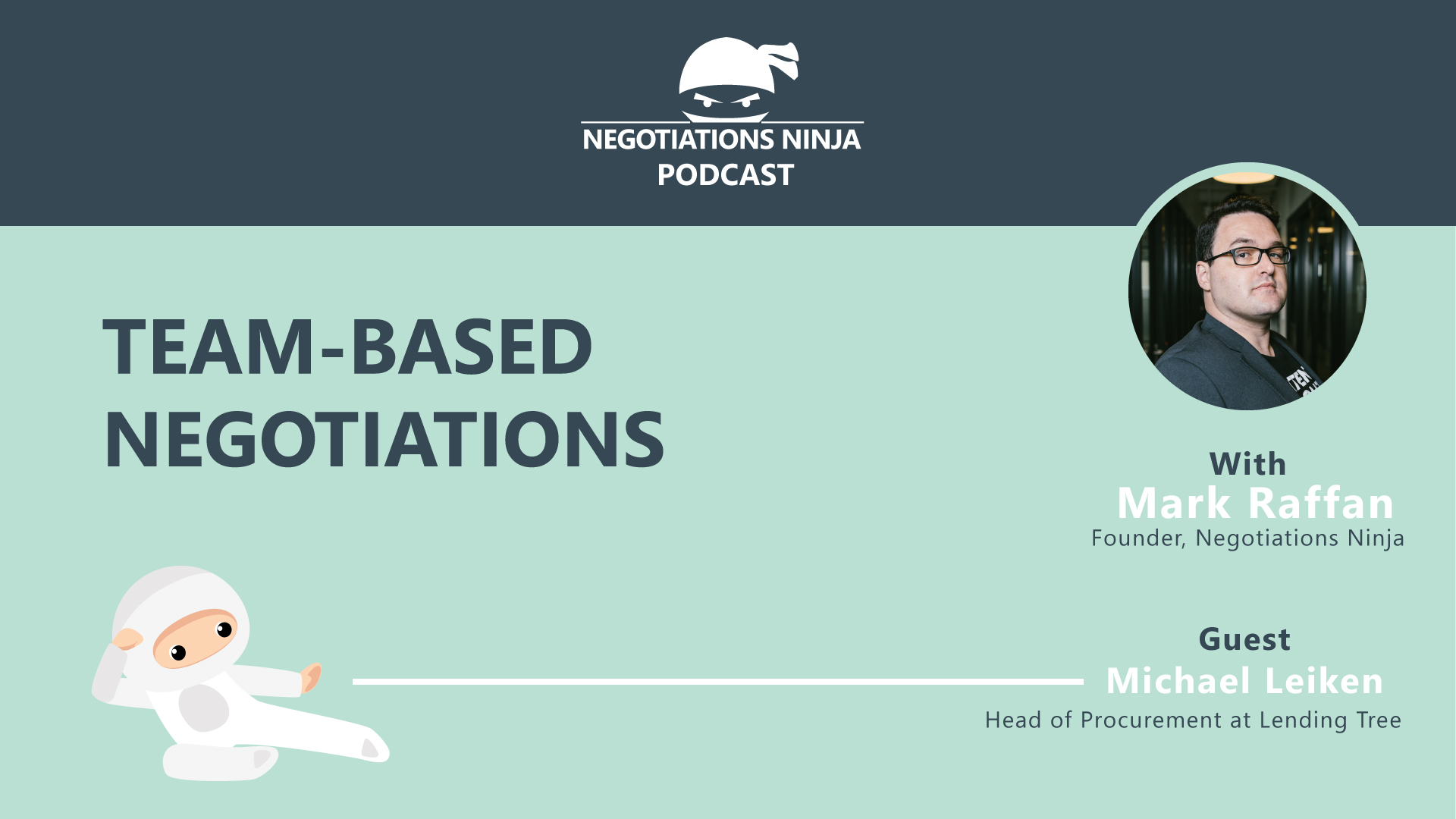What are the pros and cons of negotiating in teams? How do we get more out of collaborative team negotiations? What happens when negotiation professionals get so caught up in worrying about what others think of them that they freeze and don’t close with a great ask? Michael shares advice on getting past the fear and delivering on the ask.
Michael Leiken—now the Senior Director of Spend Management at LendingTree—created the procurement team at LendingTree from scratch. Michael shares from his 15+ years of experience in sourcing and procurement spanning multiple industries. Don’t miss his take on these two fascinating topics.
Outline of This Episode
- [2:30] Michael’s background in procurement
- [3:27] Taking a team approach to negotiation
- [6:31] How team negotiations boost creativity
- [9:48] The downfalls of team-based negotiations
- [12:27] Overcome the fear of going in with your ask
- [21:27] STOP complication negotiations unnecessarily
- [25:29] 3 ways improve your negotiation skills
- [28:27] How to connect with Michael Leiken
How to make a team approach better
We’ve all heard the saying “Two heads are better than one.” Working in a team can bring more value to the negotiation process. How? You immediately have a deeper base of knowledge. You can leverage the collective experience and expertise. Working together—from planning, to iterations, to briefing—will automatically lead to more creativity and flexibility.
Listening is a key component of negotiating. Having a team focused on listening or watching body language is immensely helpful. Michael points out you’d be surprised how different everyone’s notes are from the same meeting. Reviewing and discussing notes can reveal different insights.
Teamwork sheds light on potential opportunities that one person alone may have missed. You can focus on a level of detail that you couldn’t individually. It leads to better options to choose from and move forward with.
Michael finds it helpful to have someone else play devil’s advocate with you. Bouncing ideas off of someone allows you to reveal your weaknesses. How do you naturally or automatically respond to something with body language? You cannot be completely self-aware about how you respond in situations. A team can give you insights you wouldn’t otherwise have that you can learn and grow from.
What are some of the potential downfalls of team-based negotiations? Listen to hear Michael’s thoughts!
Embrace the power of asking
We’ve been taught or conditioned our entire lives what is or isn’t appropriate. As a result, Michael believes that we are innately overly-sensitive. Instead of focusing on our interests and goals, we’re worried about what the other side is thinking. But you can’t be afraid of how they may respond.
You have to learn to be comfortable in uncomfortable situations and conversations. This isn’t about being rude to people. It’s just about asking. We get stuck in our own heads of what we consider to be rude or inappropriate. What are they going to think if I ask for that? But what’s the worst that can happen? What will the answer be?
You’re negotiating with yourself when you’re deciding whether or not to ask for something. It’s based on your assumptions about the process. So how do you move past the fear? Practice. Ask simple things of others that you wouldn’t otherwise ask. Ask things that you’d expect to hear a resounding no to. When you hear “no” learn to realize it isn’t a big deal. The more you practice asking, the more normal it feels. So when you go into a situation where it counts it rolls off your tongue with no issues.
STOP complicating negotiations unnecessarily
People overcomplicate negotiations all the time. People treat negotiation like a game that’s adversarial and about “winning.” But what does it mean for each other to win? One of the biggest things Michael learned from his career is that sharing information and being collaborative will almost always yield a better outcome. Why?
Discerning the other party’s genuine interests is difficult. Instead of trying to figure it out, why not ask? What not share information to help hit on what you’re trying to accomplish? Don’t assume or guess what they want—ask. You can gauge how you can make it happen or alternatives you can offer in exchange for things YOU care about.
Some of the most successful negotiations Michael has had have taken the least amount of time because they were candid and direct. They could navigate and reach an agreement.
BONUS: 3 ways to improve your negotiation skills
Michael shares a few simple ways to improve your negotiation skills:
- Don’t trust your assumptions: Test your assumptions. You need to know if your entire strategy or approach is off-base.
- There’s always more: The upside in pushing for more outweighs potential downsides. You’ll almost always get more versus a flat-out no or pushing the negotiation over the line.
- Learn from past negotiations: Take notes during the negotiation to reflect on and learn from.
To hear the full spectrum of Michael’s advice and his depth of knowledge on team-based negotiations, listen to the whole episode!
Episode Sponsor
Connect with Michael Leiken
- Connect on LinkedIn
- LendingTree
Connect With Mark
- Follow Negotiations Ninja on Twitter: @NegotiationPod
- Connect with Mark on LinkedIn
- Follow Negotiations Ninja on LinkedIn
- Connect on Instagram: @NegotiationPod




